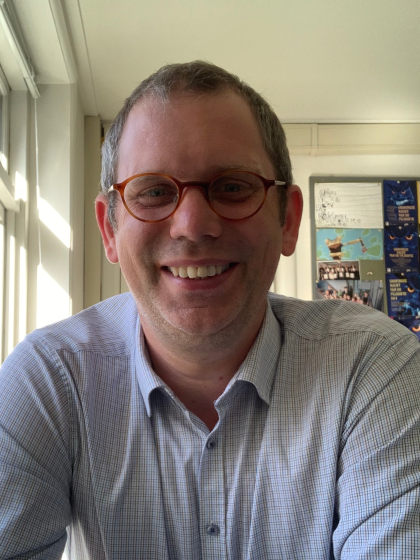Barteld Kooi has been awarded the Ammodo KNAW Prize
On the recommendation of an advisory committee of the Royal Netherlands Academy of Arts and Sciences and the Ammodo Foundation, the Ammodo KNAW Award 2015 for Humanities (amounting to three hundred thousand euros) has been awarded to Barteld Kooi, professor by special appointment of logic at the University of Groningen.
This Award was established by the Ammodo Foundation and the KNAW in 2014 to encourage unfettered fundamental scientific research. The Ammodo/KNAW Award is granted once every two years and covers all scientific disciplines. It consists of eight prizes, each worth 300,000 euros. The recipient may spend this amount at their discretion to fund either their own fundamental scientific research or a research project that they are supervising. The eight 2015 winners were selected from 114 nominations. Kooi has won one of the two awards in the field of Humanities.

From abstract philosophy to science quiz
Barteld Kooi’s research combines the apparent impenetrability of abstract information science with the ordinariness of card games and mind puzzles. His work is founded on ‘dynamic epistemic logic’: a school of philosophical research which seeks to identify fundamental logical laws on knowledge and information and the sharing or transferring of it.
His field of work involves analysing information processes and converting them into universal models that can be expressed as abstract mathematical formulae. All kinds of complex knowledge problems can thereby be tackled in accordance with common fundamental laws. Insights gained in this field can be applied in many other scientific fields, such as information science, economics, robotics, artificial intelligence, network security, cryptography, linguistics and research into different interactions between individuals and human groups.
Authority in this field
Kooi has become an authority in this field. Together with two colleagues, he wrote a standard work on dynamic epistemic logic which is widely used and quoted internationally. Moreover, he has added an important element to the existing theory: probability. He also uses elements from game theory in original ways.
For example: are there logical strategies that can be pursued in card or thinking games to achieve the best possible outcome? What knowledge must a group of people share in order to achieve optimal results together or individually? How does the sharing (or not) of knowledge influence the balance between personal and group interests? How do the odds change if information is shared or not? The logic of paradoxes is also an important theme in his work.
Deep understanding and broad overview
In his research, Barteld Kooi demonstrates a deep understanding and broad overview of his chosen field. Armed with that knowledge, he is currently investigating whether different logical systems really are different or whether they are in fact offshoots of the same strain, actually different only in the way they are described mathematically.
What is particularly remarkable about Kooi is that he combines his highly abstract work with a love of teaching and interaction with society. He has already organised three editions of the ‘Groningen Night of Philosophy’ event, which features several individual lectures, and has also invented playful questions for the National Science Quiz.
Curriculum Vitae
Prof. Barteld Kooi (1976) is a professor of logic by special appointment at the Faculty of Philosophy, University of Groningen. Kooi studied philosophy in Groningen and obtained his PhD at the Institute of Mathematics and Computing Science in the same city. He held various positions at the Faculty of Philosophy before being appointed professor by special appointment by means of the Groningen University Fund Foundation in 2011. He is a recipient of NWO Veni and Vidi grants.
Video: Fathoming fallacies
| Last modified: | 15 July 2022 3.45 p.m. |
More news
-
05 March 2025
Women in Science
The UG celebrates International Women’s Day with a special photo series: Women in Science.
-
07 January 2025
UG students dive into the European music industry
Next week, the annual Eurosonic Noorderslag music festival (ESNS) will kick off again. Two groups of students from the UG Science Shops will participate in the event. During the ESNS festival, they will investigate various societal themes.
